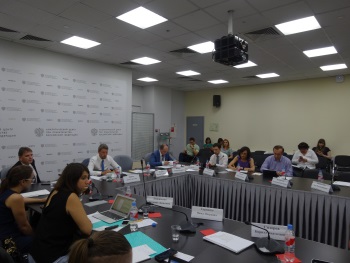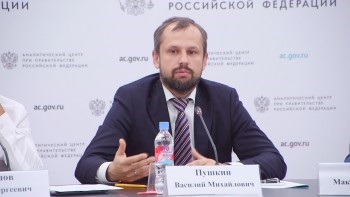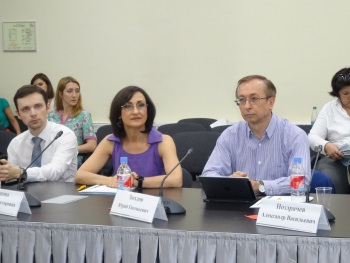|
 On 27th June, 2016 the
Workshop “Cooperation in the field of Information and Communication
Technologies, Regulation of Cross-Border Markets in the Digital Economy and
E-Commerce, Creation of Digital Space in the Framework of Integration
Associations - EAEU, CIS, SCO, BRICS, APEC, and the Development of the
Strategic Cooperation Format with the EU and China (“Digital Silk Road”)” took
place. The event was held by Eurasian Economic Union (EAEU) on the basis of the
Analytical Center for the Government of the Russian Federation. The Workshop
was attended by representatives of public authorities, the State Duma of the
Russian Federation, international and regional organizations (World Bank,
Economic Commission for Europe (ECE), the Eurasian Economic Union (EAEU)), the
Commonwealth of Independent States (CIS), the Organization for Economic
Cooperation and development (OECD), business, scientific and expert community. On 27th June, 2016 the
Workshop “Cooperation in the field of Information and Communication
Technologies, Regulation of Cross-Border Markets in the Digital Economy and
E-Commerce, Creation of Digital Space in the Framework of Integration
Associations - EAEU, CIS, SCO, BRICS, APEC, and the Development of the
Strategic Cooperation Format with the EU and China (“Digital Silk Road”)” took
place. The event was held by Eurasian Economic Union (EAEU) on the basis of the
Analytical Center for the Government of the Russian Federation. The Workshop
was attended by representatives of public authorities, the State Duma of the
Russian Federation, international and regional organizations (World Bank,
Economic Commission for Europe (ECE), the Eurasian Economic Union (EAEU)), the
Commonwealth of Independent States (CIS), the Organization for Economic
Cooperation and development (OECD), business, scientific and expert community.
From the Institute of the
Information Society the leaders - Yuri Hohlov, Chairman of the Board of
Directors, and Tatiana Ershova, Director General, as well as employees - Louisa
Rizmanova, Director of the Department of International Cooperation and Public
Relations, Vladimir Kondratiev, Leading Expert of Directorate of Regional
Programs, Irina Samorukova, Senior Analyst, Alexander Katin, Analyst, and
Vasily Pitul, Analyst, participated in the Workshop.
 The Workshop was opened with
the address to the participants by Vasily Pushkin, Deputy Head of the
Analytical Center for the Government of the Russian Federation. He noted that
at the moment many global integration processes in the field of information
society development are ongoing, as well many discussions are held at the
international level, however, they are always implemented at the national
level. The Workshop was opened with
the address to the participants by Vasily Pushkin, Deputy Head of the
Analytical Center for the Government of the Russian Federation. He noted that
at the moment many global integration processes in the field of information
society development are ongoing, as well many discussions are held at the
international level, however, they are always implemented at the national
level.
In the framework of the first
session “Information Interaction in the Implementation of Common Processes” the
issues related to the establishment of an integrated system of electronic
information exchange between public authorities of EAEU countries, provision of
transboundary national and public e-services, openness of government data, the
development and implementation of standards, cross-border exchange of
information, information security and cross-border space of trust were
considered. There were also the prospects for the use of “block chain” technology
when constructing the digital spaces in the framework of integration
associations. The participants recognized that this technology becomes widely
spread in the world, but noted the need to assess all possible risks associated
with the safe use of this technology and determine the fields of its application,
except for the banking sector.
The
second session of the Workshop was devoted to the creation of a digital cross-border
trade infrastructure and the digital transformation of the industry.
Participants discussed the use of digital signatures in the cross border
exchange of information, the development of Eurasian e-commerce infrastructure
(B2B, B2C platforms) to ensure access to public procurement through electronic
auctions, the prospects for the use of online trading platforms for the export
of products, trends in the digital transformation of the industry (“Industry
4.0”, Internet of Things) etc.
 In
the course of the session the report “Analysis of the Information Society
Development in the CIS countries according to Action Lines defined in the Action
Plan adopted at the World Summit on the Information Society (WSIS)” was
presented by Tatiana Ershova, IIS Director General. In the report the results
of a study conducted by IIS experts under contract with the JSC “National ICT
Holding “Zerde”. Zerde is the basic organization of the CIS Member States
providing methodological, organizational and technical support in the field of
information and communication technologies. In
the course of the session the report “Analysis of the Information Society
Development in the CIS countries according to Action Lines defined in the Action
Plan adopted at the World Summit on the Information Society (WSIS)” was
presented by Tatiana Ershova, IIS Director General. In the report the results
of a study conducted by IIS experts under contract with the JSC “National ICT
Holding “Zerde”. Zerde is the basic organization of the CIS Member States
providing methodological, organizational and technical support in the field of
information and communication technologies.
The
implementation of the WSIS Action Plan was analyzed based on a wide range of
research and analytical methods. As a data sources, national programs and
strategic documents in the field of ICT, results of researches, experience of
ICT development in the leading countries, as well as indicators and composite
indices of the Information Society, which are collected and calculated by
international organizations and national statistical agencies. The study showed
the digital divide between the CIS countries by the values of indicators in
seven areas of the WSIS Action Plan (e-government, e-business, e-education,
e-health, e-employment, e-environment protection, e-agriculture and e-science).
Conclusions and recommendations for each country and region as a whole related
to the implementation of measures aimed at developing of the Information Society
were provided by the experts.
Participants
of the Workshop noted the high importance of this study and suggested to conduct
such researches on a regular basis to track the dynamics of the Information
Society development.
Yuri
Hohlov took active part in the discussion on the topics considered in the
course of the second session. |

